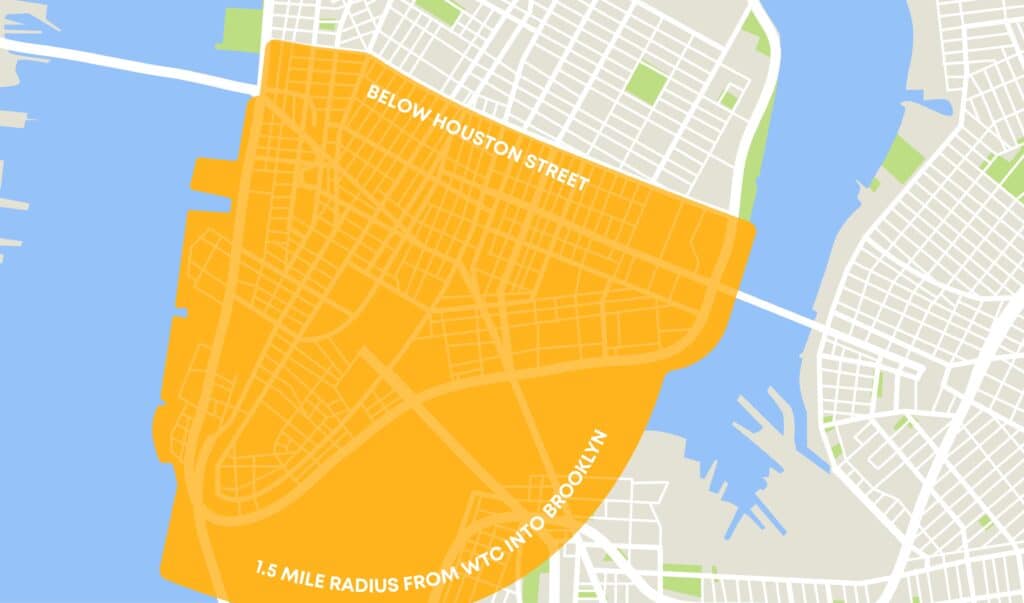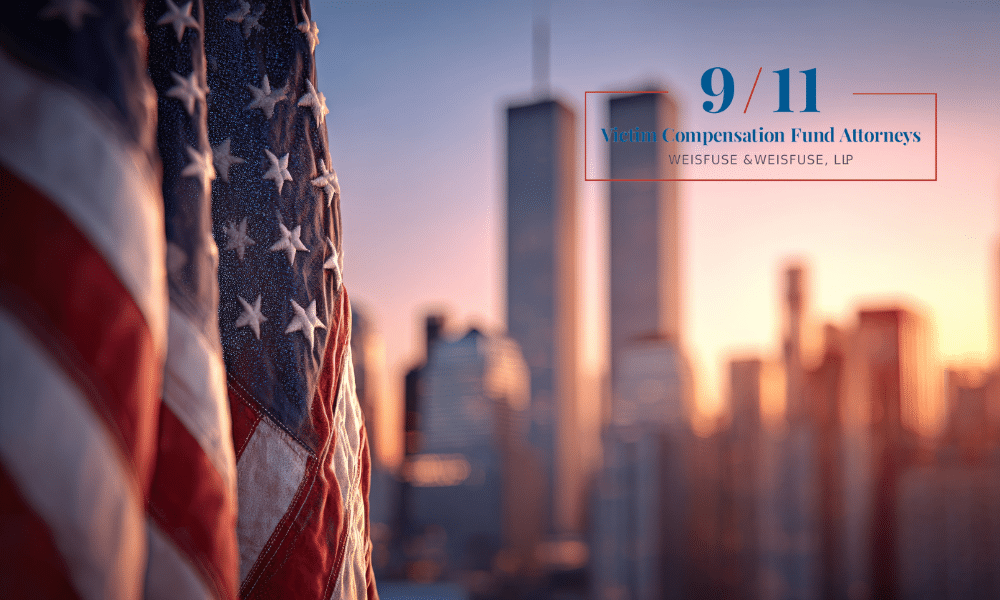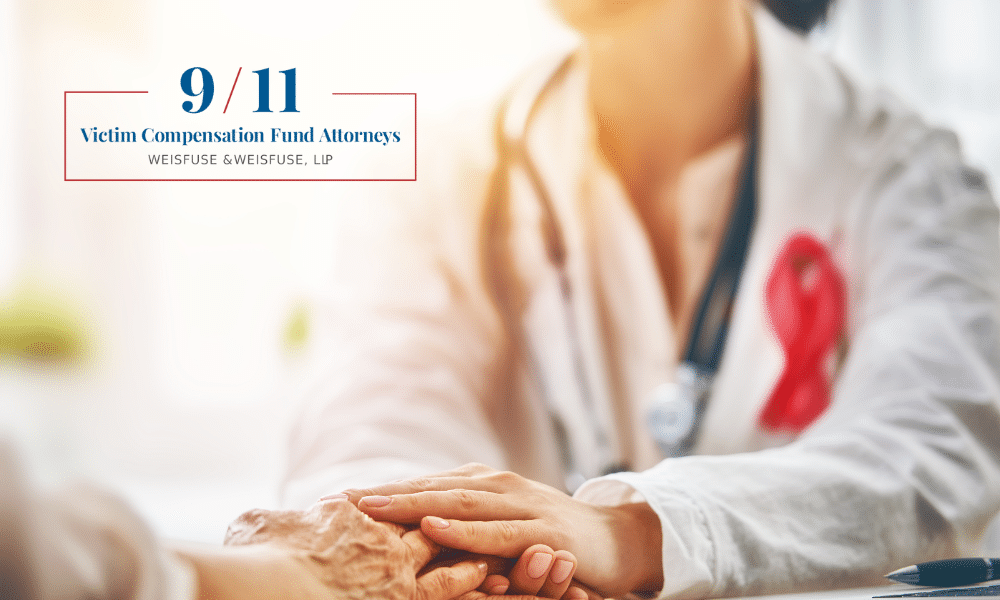
9/11 Blood Cancer Victim Compensation Fund Claims
In addition to first responders, people who lived and worked in the Exposure Zone were exposed to hazardous materials. Many have developed lymphoma, leukemia, and a variety of other cancers. If you believe you may have developed a blood cancer due to these events, it is in your best interest to contact an attorney to discuss filing a 9/11 blood cancer claim right away.
Blood Cancer and 9/11 Payouts
The World Trade Center Health Program (WTCHP) recognizes blood cancer as a 9/11-related health condition. The WTCHP determines what conditions are covered based on medical studies that show the frequency of cancers for 9/11 survivors compared to the unexposed population. It also bases its decision on the existence of any peer-reviewed medical studies that link a type of cancer to the types of carcinogens found in the Exposure Zone.
The cost of treating cancer can be high, and treatment can take months or sometimes years. If you or a family member developed cancer and you believe it was caused by exposure to 9/11 related toxins, contact the experienced lawyers at Weisfuse & Weisfuse, LLP.
What is Leukemia?
Leukemia, or blood cancer, is the cancerous growth of blood cells. There are several different types of leukemia, but most affect the bone marrow and white blood cells (WBCs). Due to the blood’s ubiquitous nature in the body, cancerous white blood cells circulate throughout the body and can be found particularly in the lymph nodes and spleen.
Bone marrow produces white blood cells, which are vital to your immune system’s natural defenses. Thus, leukemia is a particularly dangerous form of cancer, as it can quickly weaken your body’s resistance to other diseases and cause other secondary health problems.
There are many variations of leukemia, depending on the affected cell type and how quickly the disease has progressed. These variations can be grouped into four main categories:
- Acute myelogenous leukemia (AML), the most common form of leukemia with the lowest survival rate;
- Acute lymphocytic leukemia (ALL);
- Chronic myelogenous leukemia (CML); and
- Chronic lymphocytic leukemia (CLL), which usually presents itself in adults over 55 years old, the second most common type of leukemia with the highest survival rate.
Acute leukemias are characterized by a sudden appearance of symptoms and a rapid progression. Chronic leukemias appear gradually, with minimal symptoms in the early stages, and generally have a slower progression.
Symptoms of Leukemia / Blood Cancer
Since your blood interacts with all systems in your body, the symptoms of blood cancer can vary depending on which organs have been affected by cancerous white blood cells. However, in general, the symptoms of leukemia include:
- Bleeding or bruising easily
- Swollen lymph nodes, particularly in the armpits and neck
- Pain or tenderness in the bones
- Petechiae, or red spots on the skin
- Persistent fatigue
- Weight loss
- Frequent infections
- Fever or chills
How Is Leukemia Diagnosed?
If your doctor suspects that you have leukemia, he or she will order a slate of blood tests to assess your red and white blood cell count, as well as the number of platelets present in your blood. Biopsies of bone marrow and lymph nodes can help determine what type of leukemia you have, and how quickly the cells are growing.
Because of the variety of leukemias and the blood’s effect on every part of your body, it’s often difficult to ascertain a general prognosis for leukemia. As with most cancers, the patient outlook improves with earlier diagnoses. In addition, data from the National Cancer Institute (NCI) indicates that health outcomes for leukemia patients have slowly but steadily improved each year. The five-year survival rate for all types of leukemia is about 64 percent, a great improvement over the 50 percent survival rate of just 20 years ago.
Your prognosis will depend on the type of blood cancer you have, how far it has spread, and how quickly it was detected. Speak with your doctor about possible treatment options for your 9/11 blood cancer.
Blood Cancer Risks for 9/11 First Responders & Survivors
The presence of lead, asbestos, mercury, and other toxic materials at Ground Zero and in the New York City Exposure Zone has caused tens of thousands of first responders and survivors to fall ill from diseases like blood cancer. The multitude of environmental factors linked to blood cancer, as well as the latency period associated with cancer onset, means that 9/11 first responders and survivors have a heightened risk of developing blood cancer.
According to research conducted by Mount Sinai’s Icahn School of Medicine, there is “evidence of increased risk for certain cancers among 9/11 WTC-exposed responders.” The study of 28,729 first responders revealed that these individuals have a 41 percent higher risk of developing leukemia, a 25 percent higher risk of developing prostate cancer, and a 219 percent higher risk of developing thyroid cancer.
VCF Compensation for 9/11 Blood Cancer
Fortunately, medical researchers studying the 9/11 community have caught pre-cancer conditions in many of their subjects, allowing the affected victims to monitor their health more closely for signs of developing cancer. The World Trade Center Health Program provides cancer monitoring and treatment for those present in the aftermath of 9/11. Prompt and frequent screenings are critical to early diagnosis of blood cancer and greatly improve patient outcomes. Therefore, even if you feel well at present, taking advantage of these programs now could be lifesaving in the future.
To qualify for the WTCHP or VCF, you must prove that you were present at any of the 9/11 disaster sites: the New York City Exposure Zone, the Pentagon, or the crash site in Shanksville, PA. The requirements for proof of presence vary between programs, and each program defines the Exposure Zone differently.
There are different requirements for the duration of presence in the Exposure Zones for survivors and responders. The WTCHP benefits for first responders are broader than those of survivors, including better access to treatment sites and more comprehensive screenings for 9/11-related health conditions.
If you are unsure if you qualify for either of these programs, one of our experienced 9/11 blood cancer lawyers can help you determine your eligibility.
Types of Blood Cancers Covered By the 9/11 VCF
- Diffuse non-Hodgkin lymphoma
- Follicular (nodular) non-Hodgkin lymphoma
- Hodgkin’s disease
- Leiomyosarcoma
- Leukemia of unspecified cell type
- Lymphoid leukemia
- Lymphosarcoma and reticulosarcoma
- Macroglobulinemia
- Malignant immunoproliferative diseases
- Monocytic leukemia
- Multiple myeloma and malignant plasma cell neoplasms
- Myelodysplastic syndrome
- Myeloid leukemia
- Other and unspecified malignant neoplasms of lymphoid hematopoietic and related tissue
- Other and unspecified types of non-Hodgkin lymphoma
- Other leukemias of specified cell type
- Peripheral and cutaneous T-cell lymphomas
- Thrombocythemia
It is important to note that the latency period for lymphoproliferative and hematopoietic cancers (including all types of leukemia, lymphoma, and multiple myeloma) is 146 days.
This is important because if you were diagnosed with cancer after 9/11 but before the latency period for that particular type of cancer, the World Trade Center Health Program will determine that your cancer was not caused by toxic exposure from 9/11 and you will not be eligible for compensation or medical treatment.
Contact Weisfuse & Weisfuse, LLP Today
When cancer has been detected, the diagnosis can be devastating. The earlier a doctor detects it, the better the outcome. Each case is unique and the chances of remission will depend on the nature and extent of your cancer.
If you or a family member has been diagnosed with 9/11-related leukemia or blood cancer, let us deal with prosecuting your legal rights so you can focus on taking care of your health. Working with an experienced 9/11 attorney is the most effective way to file your 9/11 blood cancer claim.
If you or a loved one has a cancer diagnosis, we can get you the compensation you deserve. If you have cancer and were present in the 9/11 Exposure Zones, you may be entitled to monetary compensation. Call us at 212-983-3000 or contact us to schedule a free consultation.







